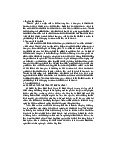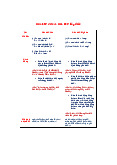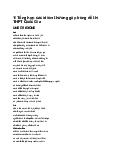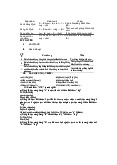
Preview text:
Writing task 2
Topic: One of the consequences of improved medical care is that people are living longer and life expectancy is increasing.
Do you think advantages outweigh disadvantages?
-> In the past few years, medical care is constantly on the rise people are benefited by taking
medical services and experience long life. This situation has some positive aspects, also has some
drawbacks; however, in my opinion, the former outweight the latter. All these perspectives will be explored in this essay.
On the one hand, there are some limitations as human life expectancy becomes longer. The
clearest evidence is that the more elderly people in a society, the more doctors and health workers
society needs. For example, when you walk into hospitals in Vietnam, most of the patients are
middle-aged or older, the reason for this is that the elderly is more susceptible to diseases than
young people. In addition, if senior citizens are not working, they will have no savings and
pensions to pay for their lifestyle, medicine, and treatments. This means that governments and
some insurance companies will have to spend large sums on pension insurance and pension
income over a long period of time, so that, in the future, pension income and pension insurance
can be eliminated because the government and companies lose a lot of funds.
On the other hand, I think the benefits to society outweigh the drawbacks for several reasons.
Improving medical care can radically overcome major problems such as cancer, diabetes, flu, and
more. As a result, it gives patients more time to survive. Besides, the elderly are often experienced
people, they can help take care of young children while young people are busy with their work,
passing on traditional cultural values to the next generation, or even contribute to the government
by engaging in non-employment jobs. For instance, in Vietnam, many senior people work at
commune people's committees when they retire from their former jobs.
To sum up, there are some disadvantages of increasing life expectancy such as the increased
demand for human resources in the health sector, and difficulties for the government and
insurance companies in pensions and elderly benefits; however, I believe its advantages over
aspects such as traditional culture, society, family and personal health will prevail. Tips for writing task 2
Step 1: Answer is relevant to the question
Step 2: Answer all parts of the question
Step 3: Organise your essay logically, with clear progression using linking phrases
Step 4: Organise your essays into paragraphs
Step 5: Use less common vocabulary and spell it correctly
Step 6: Don’t use memorised language, phrases or examples
Step 7: Use a variety of complex sentence structures Step 8: Checklist




